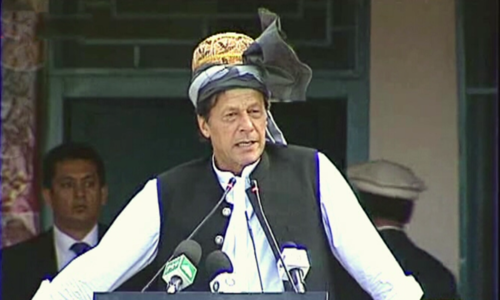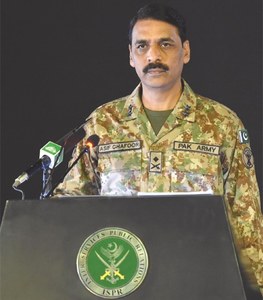3 people killed, 5 soldiers injured in exchange of fire at check post in North Waziristan

Following reports of violence during a protest in North Waziristan on Sunday, the Inter-Services Public Relations (ISPR) released a statement in the afternoon saying that a check post in the area was assaulted by a group and in an exchange of fire, three people were killed while 15 were injured ─ including five soldiers.
According to the statement by the Army's media wing, MNAs Mohsin Dawar and Ali Wazir ─ both of whom are leaders of the Pashtun Tahaffuz Movement (PTM) ─ were leading the group.
"A group led by Mohsin Javed [Dawar] and Ali Wazir assaulted Kharqamar check post, Boyya, North Waziristan tribal district this morning. They wanted to exert pressure for release of suspected terrorists’ facilitator arrested the other day," added the statement, without specifying who the suspect was.
"Troops at the check post exercised maximum restraint in the face of provocation and direct firing on the post. Due to firing of the group, five Army soldiers got injured. In exchange of fire, three individuals who attacked the post lost their lives and 10 got injured," it said.
All injured have been shifted to Army Hospital for treatment, said the ISPR statement, adding that Ali Wazir along with 8 individuals have been arrested while Mohsin Javed [Dawar] is at large.
Dawar, while speaking to VOA Deewa, denied that the group opened fire and accused the Army of initiating violence.
Fazl Khan, a core committee member of PTM, said that the protesters were unarmed and innocent. "How can they reach Waziristan with arms when there is a check post at every kilometre?" Khan asked.
Director general of ISPR, Maj Gen Asif Ghafoor, in the evening addressed the "North Waziristan tribal district incident", saying that "innocent PTM supporters/workers need care".
"Only few are inciting and using them against state institutions for vested agenda. No one will be allowed to undo the gains of decades long national struggle & sacrifices especially of brave Pakistani tribals," Maj Gen Ghafoor said via Twitter.
Violence at protest
Earlier in the morning, reports of violence during a sit-in had started making rounds. PTM sources had told Dawn.com that at least 20 people were injured after violence erupted during a sit-in being held in North Waziristan's Doga Macha Madakhel area.
The sit-in staged by residents of the area against the alleged assault on a local woman began on Saturday and was joined by workers of the PTM today. Sources within the PTM said the protest was calm until MNAs Dawar and Wazir reached the area to participate in the sit-in.
Upon their arrival, protesters began sloganeering and the situation turned tense. Unidentified individuals opened fire on the crowd of protesters, PTM sources told Dawn.com, after which Wazir was taken into custody and Dawar received a minor hand injury.
As local news outlets reported that a clash had taken place between law enforcement agencies and the PTM protesters, unverified visuals of the protest and ensuing violence started circulating on social media.
A curfew was imposed in North Waziristan following the incident, and landline, internet and cellphone services have all been suspended, PTM and local sources told Dawn.com.
PTM is a rights-based alliance that, besides calling for the de-mining of the former tribal areas and greater freedom of movement in the latter, has insisted on an end to the practices of extrajudicial killings, enforced disappearances and unlawful detentions, and for their practitioners to be held to account within a truth and reconciliation framework.
In April, Prime Minister Imran had addressed a public gathering in Orakzai in which he endorsed the grievances of Pashtuns, but said that agitation would not yield any benefits.
"PTM rightly speaks about the hardships faced by the tribal areas and the Pashtun people, but the manner in which they are making such demands is not good for our country," the premier had said.
Less than two weeks later, the Army read out a charge sheet against PTM, accusing the Pashtun ethnic rights movement of receiving funds from foreign intelligence agencies and hinted at a possible action against it.
“Those playing in others’ hands, their time is up. Their time is up,” Maj Gen Asif Ghafoor had warned at the time. This was one of the most hard-hitting statements against the PTM by the military to date, though in the past there had been warnings to the group against crossing the proverbial ‘red line’.
MNA Dawar, speaking on the floor of the house, had rejected the allegations levelled by the military spokesman against the PTM and said his party was ready for accountability before the parliament only.
According to Dawar, the PTM was being targeted for making the Army accountable on the issues of "missing persons in tribal areas, extrajudicial killings and targeted killings".
A few days after the DG ISPR's press conference, Chief of Army Staff Gen Qamar Javed Bajwa had said that while the PTM itself was "not an issue", certain individuals "playing in foreign hands" were exploiting the sentiments of people who have suffered hardships because of terrorism.
The army chief had stressed that both the government and the security forces were working to address the genuine issues of the residents of tribal areas "regardless of where they come from".
Politicians condemn violence
Speaking to journalists in Larkana, PPP Chairperson Bilawal Bhutto Zardari said: "I'm sorry, what? How can Mohsin Dawar attack a checkpost? I don't think an elected representative can conduct such an attack. And, if violence has taken place, we surely condemn it. But, violence should also not take place against peaceful citizens and political workers, whose right it is to hold a peaceful protest. I will find out the facts.
"I have been saying since day one that you may disagree with them [PTM], you can diagree with their point of view 100 per cent, you can argue with them. But, if you will not engage with the young politicians who come from a place such as Fata, if you will not attempt to reduce their grievances or justify their misperceptions, then we have all seen what used to happen during the Musharraf era in Balochistan. We have all seen what happened with Bangladesh, with East Pakistan, following Ayub Khan's dictatorship. And now, if we will label our own citizens, our own children, our own politicians traitors when they talk about rights, democracy, civil rule of law, then we will set ourselves on a very dangerous path," warned Bilawal.
Meanwhile, Maryam Nawaz, a vice-president of the PML-N, in a series of tweets expressed sorrow over the loss of lives and injury to multiple people.
"Every Pakistani citizen's life is precious and his blood sacred. If blood is spilled, the facts must be revealed to the nation. Love, peace, and understanding are far more powerful than weapons. Have we not already paid a very heavy price for crushing protests and stifling voices? May God have mercy on Pakistan," she wrote in the first of three tweets.
"Pakistan cannot remain tolerant of internal tensions. If on both sides there are sons of Pakistan, then political and journalistic circles along with state institutions will have to play a responsible role or else Pakistan may incur irreparable damage," she added in a subsequent tweet.
"May Allah grant patience to the heirs of the deceased and health to all those injured," she concluded in the last tweet.
Akhtar Mengal, the president of the Balochistan National Party faction of his own name (BNP-Mengal), also came forward on Twitter to condemn the attack on protesters.
"Strongly condemn the attack on #PTM workers today. Attacking a peaceful demonstration is in no way acceptable. Violence should not be used to scare those who use peaceful ways to protest," he wrote.
Jamiat Ulema-i-Islam-Fazl (JUI-F) chief Maulana Fazlur Rehman, too, in a statement released by his spokesperson expressed sympathy with the deceased and injured in the attack.
"In the democratic world, people have the right to protest," he said, adding that "stopping them from this [conducting a protest] is tantamount to giving birth to incitement and extremism".
He said that the state was responsible for safeguarding the life and property of people, and that the common man today considers himself unsafe from the government.














































